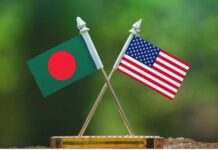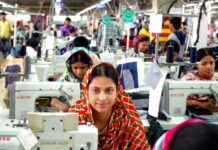The prime minister had already given her consent to the finance minister’s proposal for joining the BRICS bank named New Development Bank
Bangladesh has made a final decision to join the $50bn development bank formed by the BRICS nations, Finance Minister AMA Muhith has said.
“We want to join the BRICS bank as more sources of credit other than the World Bank, the Asian Development Bank and the International Monetary Fund must be explored,” the finance minister told reporters after a meeting with ADB Vice-President Laksmi Venkatachalam at his secretariat office yesterday.
At present, Bangladesh was little interested in joining the Chinese Asian Infrastructure Investment Bank because it had got delayed, “but when it is formed, we will join it,” he said.
Finance Ministry officials said the prime minister had already given her consent to the finance minister’s proposal for joining the BRICS bank named New Development Bank. The proposal would be placed before the Cabinet soon.
Officials also said the government had already sent letters to the relevant agencies, including the Dhaka embassies in the five BRICS countries: Brazil, Russia, India, China and South Africa. The letters sought details on the framework and operation procedures of the New Development Bank.
Two months ago, Chinese ambassador in Dhaka conveyed an invitation to the Bangladesh government for joining the newly formed BRICS bank. After that, the finance minister held two meetings with the Chinese and Indian ambassadors regarding the issue.
The heads of governments of the five BRICS nations agreed on July 16 in Brazil on the structure of the $50bn development bank by granting China its headquarters and India its first rotating presidency.
Brazil, Russia and South Africa were also granted posts or units in the bank, which aims to become an alternative source of development funding other than the World Bank, the IMF and the ADB.
The new bank will have an initial authorised capital of $100bn, with $50bn in initial subscribed capital. The Contingent Reserve Agreement will have an initial size of $100bn.
The bank will have its headquarters in Shanghai, China, and its first CEO will be an Indian, the first chairman of the board of governors will be a Russian, and Brazil will appoint the first chairman of the board of directors. South Africa will host an African regional centre.
Bangladesh now borrows from the World Bank, the IMF, the ADB, the Islamic Development Bank (IDB) and other bilateral and multilateral lenders for bankrolling its development projects. Bangladesh is one of the shareholders of the World Bank and the IDB and regional lender of the ADB. However, the shares are not significant.
According to sources, Bangladesh has 0.022% share in the 188-member World Bank, 1% in the 67-member Manila-based ADB and 1.01% stake in the 56-member IDB.
World Bank lead economist Zahid Hussain told the Dhaka Tribune that the BRICS bank, along with the Chinese Asian Infrastructure Investment Bank would be complementary to Bangladesh’s present development partners.
The funds provided by the three top lenders are not even close to what Bangladesh or the Asian regions need for development, he said.
Zahid assured that the World Bank was not worried about the proposed institutions as they would compliment the development works of the Bretton Woods institution.
Member of the General Economics Division of the Planning Commission Professor Shamsul Alam told the Dhaka Tribune that the government’s decision to join the BRICS bank was “really laudable.”
“By joining the New Development Bank, Bangladesh will stamp a strong footprint by having a new option for getting more concessional investments for developing the country’s infrastructure and for cutting high cost loan from multinational banks,” he said.
After the meeting with the Bangladesh finance minister yesterday, ADB VC Laksmi Venkatachalam said she had hoped that Bangladesh would become a middle-income country within a year.
She also said the ADB would give more fund for developing infrastructure, communication, agriculture and the ICT sectors in Bangladesh.
Source: Dhaka Tribune










